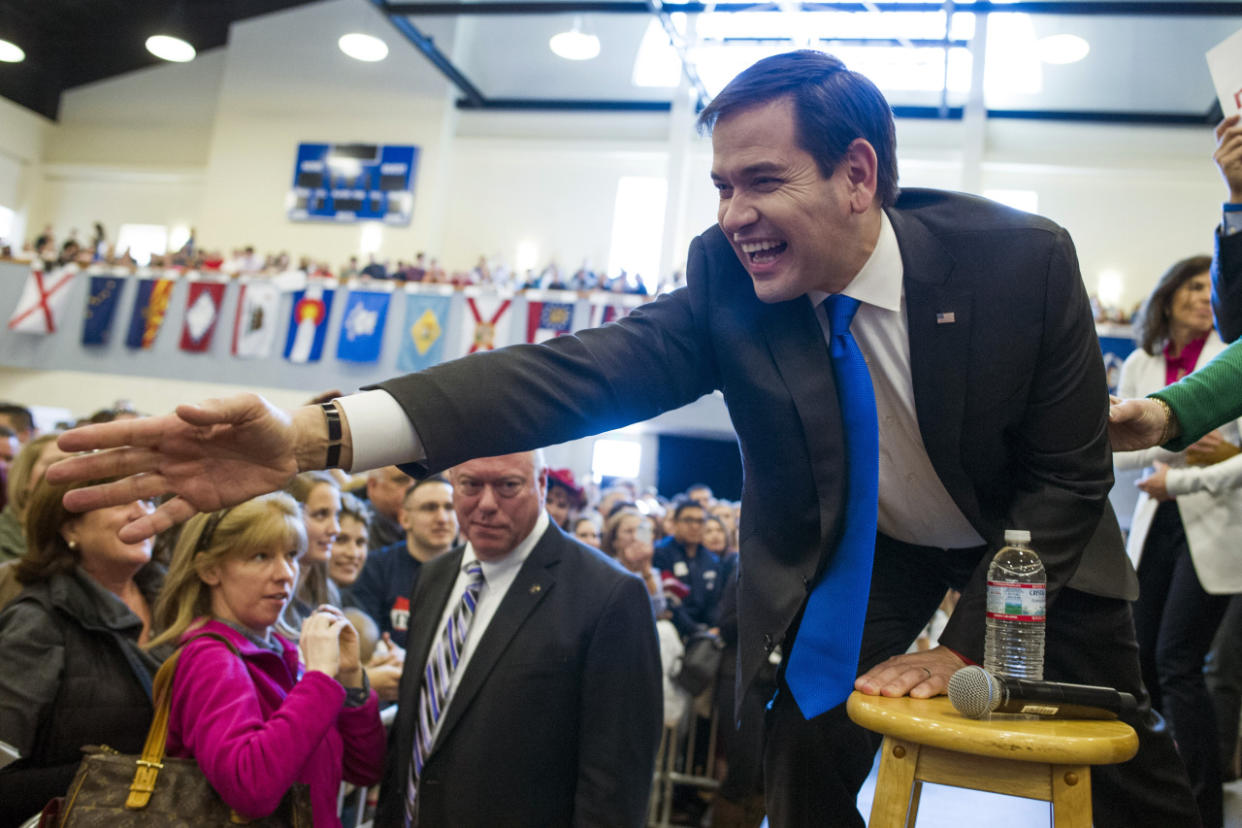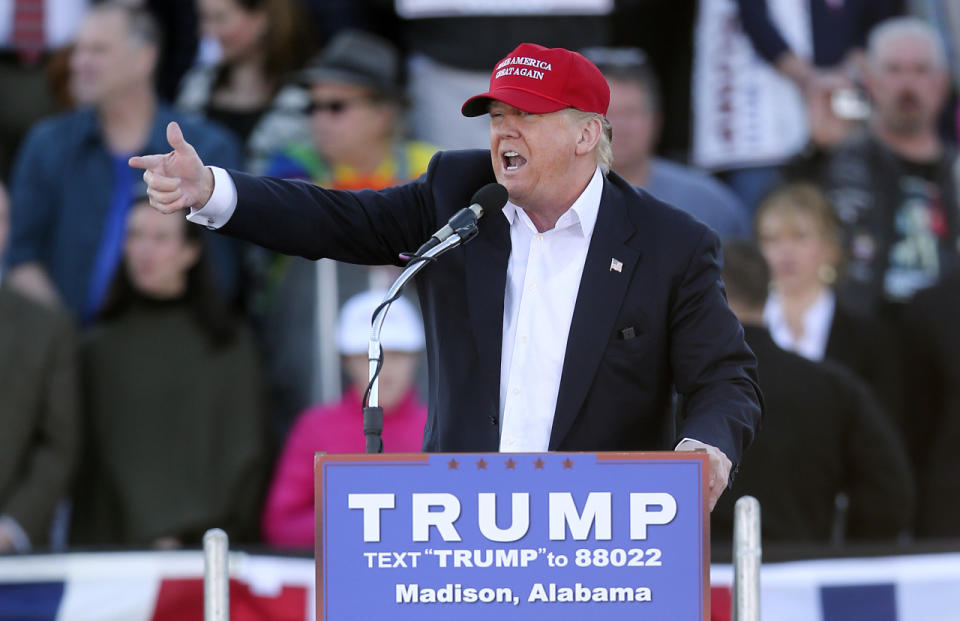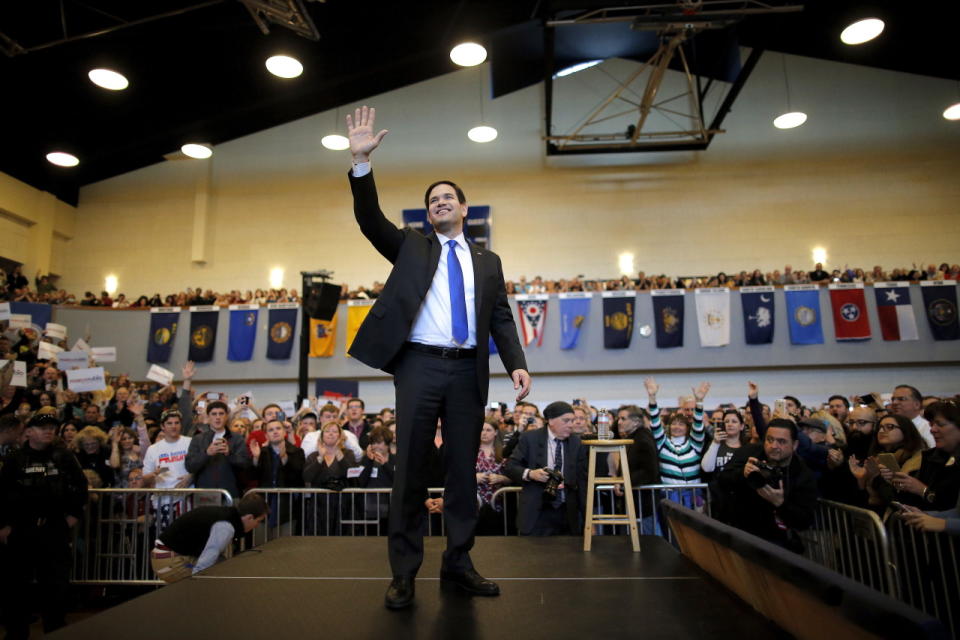Rubio puts Trump on defense but still trails in most polls

Republican presidential candidate Sen. Marco Rubio shakes hands with supporters at a rally in Purcellville, Va., on Feb. 28. (Photo: Cliff Owen/AP)
PURCELLVILLE, Va. — When Marco Rubio recalled his debate showdown with his rival for the Republican presidential nomination Donald Trump, the rush of applause and cheering that filled a college gymnasium here Sunday afternoon sounded like a huge sigh of relief.
For the several thousand listening to the U.S. senator from Florida, the emergence of someone — anyone — to throw punches back at Trump was cathartic.
In fact, the crowd didn’t even let Rubio finish his sentence when he brought up the debate in Houston. He began: “Thursday night, I decided that it was time to unmask the true nature of a man—”
The rest was drowned out by the roar of the crowd here on the campus of Patrick Henry College, an hour west of Washington, D.C.
As Mike Farris, the chancellor of Patrick Henry College, and one of the pioneers of the Christian homeschooling movement in the United States, put it: “Somebody has to tell the truth about Donald Trump.”
To evangelicals like Farris, the unleashing of Rubio over the last three days has made him the “premier challenger” to Trump. That’s despite the fact that a former student remarked to me that he had thought Farris would endorse Sen. Ted Cruz, R-Texas, whose background in competitive debating makes him a model of the kind of student Patrick Henry tries to produce.
Yet Farris said that at Patrick Henry, “Most of the student body, for sure, and many of the faculty and others are definitely leaning strongly toward Rubio.”
“Trump is a persona non grata around here, mostly,” Farris said. “There’s a good amount of Cruz support as well. … But I think Rubio’s approach — the hope for the next generation — is more appealing to most of the people here.”
Rubio held four rallies Sunday in different parts of Virginia, one of four states where his campaign holds out hope of stealing a win from Trump on Super Tuesday. There are 12 states holding primaries or caucuses Tuesday. The Rubio campaign thinks it can perform best in Virginia, Arkansas, Minnesota and Oklahoma.
The Virginia barnstorming tour continued at a furious pace for Rubio, who also held four events in three states on Saturday and has five events in four states scheduled for Monday. The almost frantic schedule underscores the reality for Rubio — that although he has momentum, he is still far behind Trump in most polls, and desperately needs a win somewhere Tuesday.
Rubio has succeeded, however, in diverting some of the political conversation away from Trump.
On Sunday morning, Trump found himself on the defensive on each of the four news talk shows to which he gave interviews. On “Fox News Sunday,” for example, his interview with Chris Wallace hit five topics: Rubio’s charge that Trump is “a con man”; the admission by Trump that illegal immigrants from Poland worked on the construction of Trump Tower; criticisms about the legitimacy of a now-defunct business called Trump University; the question of whether Trump will release his tax returns; and Trump’s comments that he would like to make it easier to sue news organizations for libel.
Trump also doubled down on a statement he made after Thursday’s debate, in response to questions about why he has hired hundreds of foreign-born immigrants for jobs at his Mar-a-Lago resort in Florida, even though job applications were received from hundreds of American citizens. As he has before, Trump insisted that many American citizens would not want such jobs, an argument that undercuts his harsh anti-immigration rhetoric.
“A lot of the people that we have made offers to … when they hear it’s a part-time job, or a it’s a four-month or five-month job — and I understand this — they’re not interested. They’re American people. They’re not interested,” Trump said on CBS’ “Face the Nation.”
Continuing his newsmaking Sunday, Trump also refused, on CNN’s “State of the Union,” to repudiate former Ku Klux Klan leader David Duke, and the Klan itself.
“Would you just say unequivocally you condemn them and you don’t want their support?” CNN’s Jake Tapper asked Trump.
“Well, I have to look at the group. I mean, I don’t know what group you’re talking about,” Trump said. “Certainly, I would disavow if I thought there was something wrong.”
“I mean, I’m just talking about David Duke and the Ku Klux Klan here,” Tapper said.
“Honestly, I don’t know David Duke. I don’t believe I have ever met him. I’m pretty sure I didn’t meet him. And I just don’t know anything about him,” Trump replied.
Trump was not telling the truth. In 2000, he told Matt Lauer on NBC’s “The Today Show” that he was not going to run for president as a candidate of the Reform Party precisely because of Duke’s involvement in the party.
“You’ve got David Duke just joined: a bigot, a racist, a problem. This is not exactly the people you want in your party,” Trump told Lauer.
In Virginia, Rubio told the crowd at Patrick Henry about Trump’s statements in 2000. “He knows exactly who David Duke is,” Rubio said. “We cannot be a party that nominates someone who refuses to condemn white supremacists and the Ku Klux Klan.”
Sen. Tim Scott, R-S.C., the Republican Party’s only African-American senator, released a statement saying that “Any candidate who cannot immediately condemn a hate group like the KKK does not represent the Republican Party, and will not unite it.”
Trump was clearly irritated by Rubio’s calling him a “con man,” in return mocking Rubio during his one public event of the day, in Alabama.
“Now he wants to act like a big man. ‘Oh, Trump’s a con man. Trump’s a con man.’ I’m a con man?” Trump said. “I built a business. … And I gotta listen to this guy?”
Trump returned to the subject later in his speech.

Republican presidential candidate Donald Trump speaks at a rally in Madison, Ala., on Feb. 28. (Photo: John Bazemore/AP)
“It was such an insulting thing. You don’t call somebody of achievement that when you’ve done nothing. This guy is a dishonest guy. He’s not cool. He sweats too much. And I don’t want him negotiating for us,” he said.
The real estate mogul, who has taken to calling Rubio “Little Marco,” attacked Rubio in vague terms over some of his financial dealings that have come under heavy scrutiny in the past, but spent most of his time ridiculing Rubio’s debate meltdown in New Hampshire earlier this month, when he repeated himself numerous times in response to criticism from New Jersey Gov. Chris Christie. Christie, who dropped out of the race, has since endorsed Trump.
“We don’t need a fainter to negotiate with China and Putin. We don’t need a fainter to knock the hell out of ISIS,” Trump said, intimating that Rubio would not be up to the task of president. “We don’t need a guy who’s sweating and scared.”
At Rubio’s last rally of the day, in rural southwest Virginia, he responded to Trump with more of the ridicule that he has begun to use against the reality TV star. Trump, Rubio said, “doesn’t sweat because his pores are clogged from the spray tan.”
He also alluded to the size of Trump’s hands, a subject about which Trump has shown that he is apparently insecure, and used it to call into question Mr. Trump’s manhood.
“He’s always calling me ‘Little Marco.’ I’ll admit, he’s taller than me. He’s like 6-foot-2, which is why I don’t understand why his hands are the size of someone who’s 5-foot-2”. Have you seen his hands?” Rubio said, holding up his hands with fingers clenched. “They look like this.”
“And you know what they say about men with small hands,” Rubio joked. “You can’t trust them.”
The Republican primary has entered into new territory over the last week. Trump’s huge win in the Nevada caucuses last Tuesday, following big victories in South Carolina a week ago and in New Hampshire on Feb. 9, has ushered in a sense of doom for those in the Republican Party who thought he would eventually fade or self-destruct.

Sen. Marco Rubio waves to supporters at a college campaign stop in Purcellville, Va., on Feb. 28. (Photo: Carlos Barria/Reuters)
Rubio has emerged as the only Republican willing, and able for at least a few days now, to counter Trump’s brutal mockery and outsized, dominating media presence. Underneath the jokes, Rubio and his campaign are nearing a place of no return, of total and complete opposition to Trump that precludes ever closing ranks behind Trump if he is the nominee.
Other Republicans are reaching a similar point. Sen. Ben Sasse, R-Neb., who has been an outspoken critic of Trump, said on Twitter Sunday night that if Trump becomes the nominee, he will not support him. “If Trump becomes the Republican nominee, my expectation is that I’ll look for some third candidate — a conservative option, a Constitutionalist,” Sasse wrote.
Rubio, who used the hashtag #NeverTrump on Twitter this past weekend, talked openly of a contested convention on CBS’ “Face the Nation.”
“Let me just say the rules are what they are in the Republican Party. You have to have x number of delegates in order to be the nominee. And if you don’t have those number of delegates, then there’s a process in place,” Rubio said.
“Here is what is never going to happen in this race: There’s never going to be a time where the Republican Party rallies around and says, ‘You have to get out, or anyone has to get out, for purposes of rallying around Donald Trump,’” Rubio said. “And so we’re going to do whatever [it] takes. We will be in this race as long as it takes.”
Rubio repeated this point on Fox News.
“You need 1,237 delegates to be the Republican nominee. Donald Trump will never have that number of delegates. I don’t care how long I have to work,” he said.


